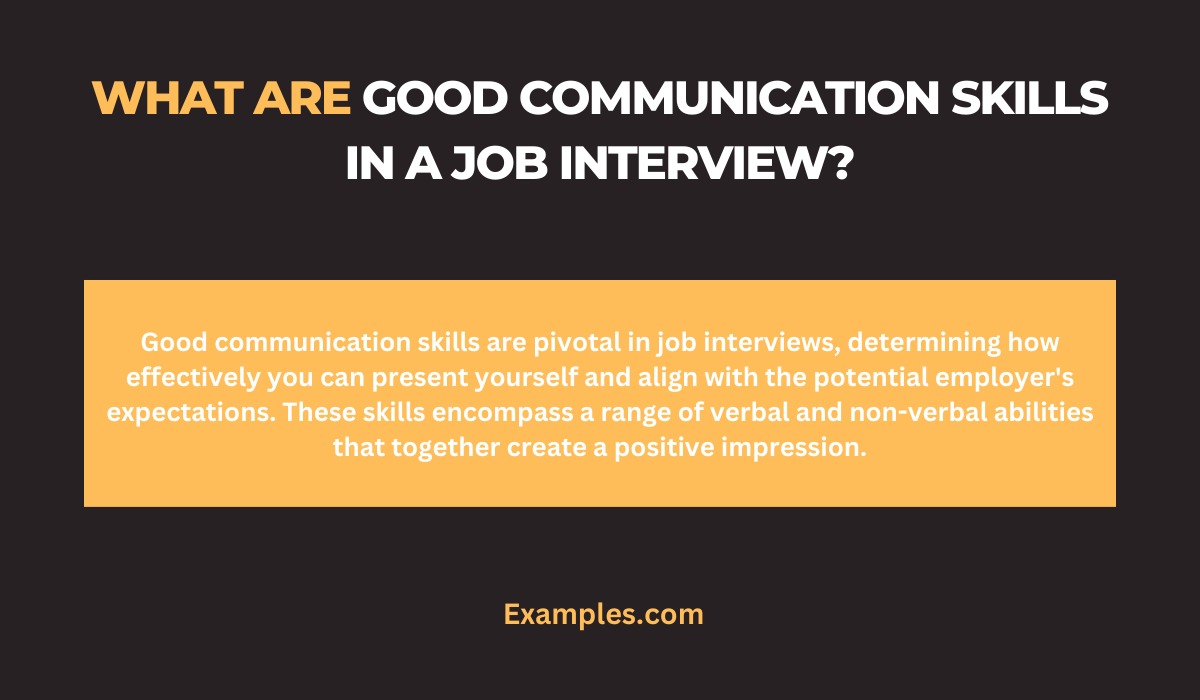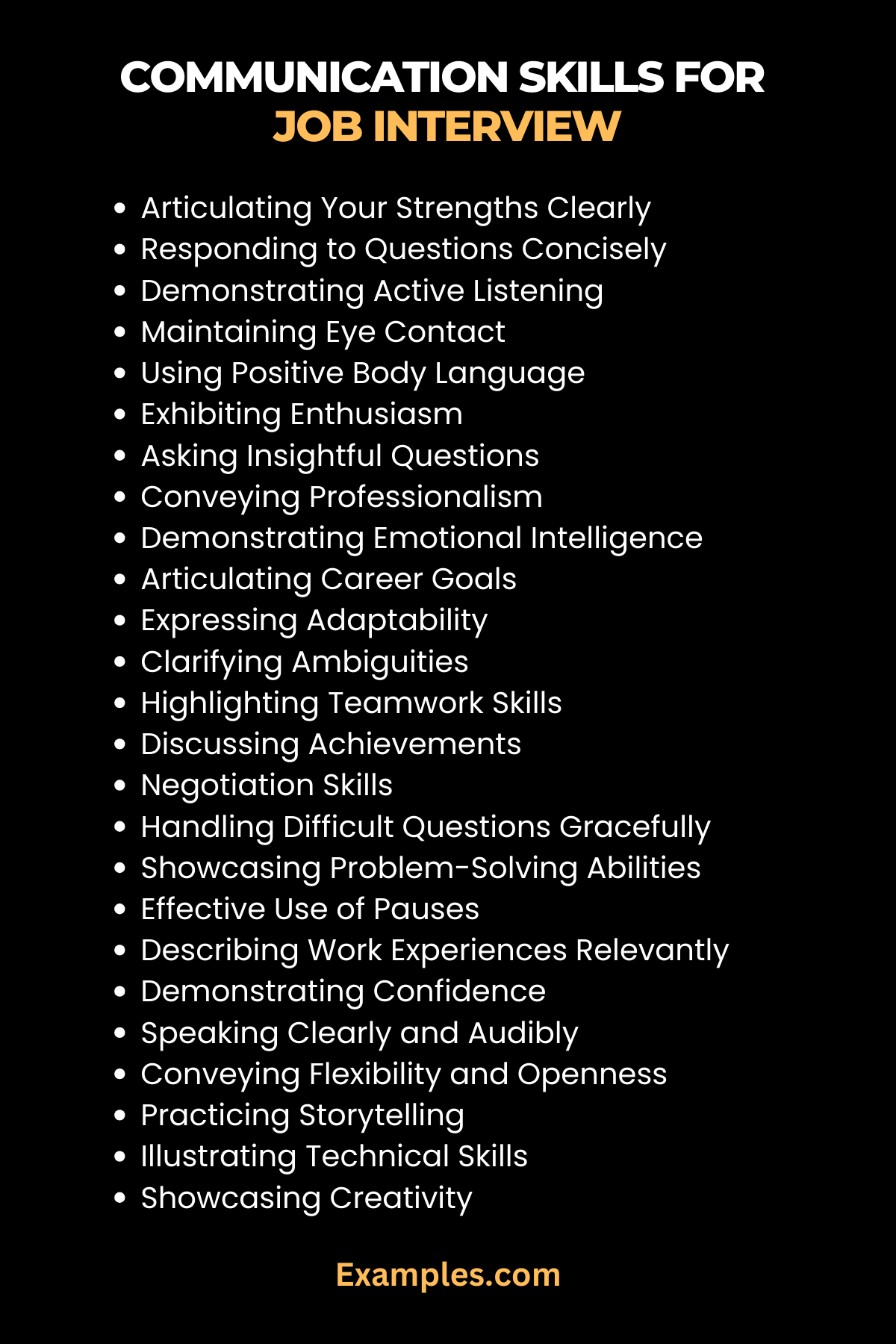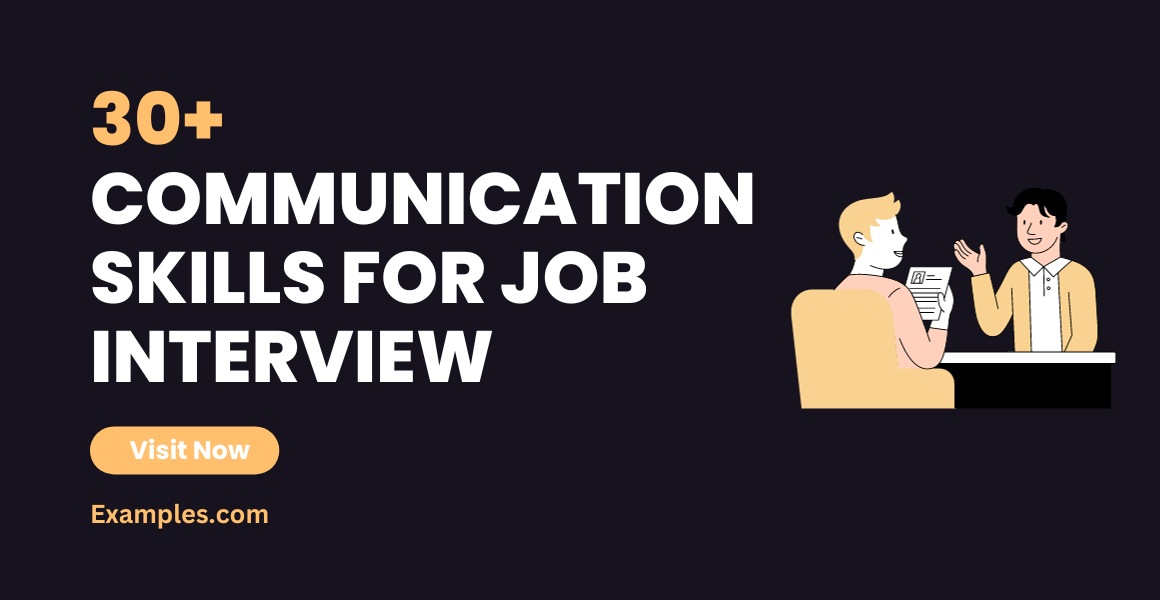29+ Communication Skills for Job Interview Examples
Mastering Communication Skills is crucial for job interview success. This guide focuses on refining your verbal and non-verbal communication skills to impress potential employers. Effective communication in interviews goes beyond answering questions; it’s about conveying confidence, clarity, and competence. Understanding these nuances can significantly enhance your interview performance, setting you apart in the competitive job market. Here, we explore key strategies to develop these skills for a standout interview experience.
What are Good Communication Skills in a Job Interview?
Good communication skills are pivotal in job interviews, determining how effectively you can present yourself and align with the potential employer’s expectations. These skills encompass a range of verbal and non-verbal abilities that together create a positive impression.

Clarity and Articulation
- Concise Responses: Providing clear and concise answers demonstrates your ability to communicate effectively. It’s crucial to articulate your points without unnecessary elaboration.
- Relevant Content: Tailor your responses to be directly relevant to the questions asked. This shows your focus and ability to understand and address specific topics.
Active Listening
- Engaged Responses: Active listening involves fully engaging with the interviewer’s questions and comments. This means processing the information and responding thoughtfully.
- Clarifying Queries: When unclear about a question, politely asking for clarification is better than assuming or providing an irrelevant answer.
Non-Verbal Communication
- Positive Body Language: Non-verbal cues like nodding, maintaining eye contact, and an open posture can greatly influence how your communication is perceived.
- Facial Expressions: Using appropriate facial expressions conveys your interest and responsiveness to the conversation.
Confidence and Composure
- Self-Assured Speech: Speak with confidence, using a steady tone and pace. This projects self-assurance and helps in articulating your thoughts more clearly.
- Calm Demeanor: Maintaining composure, especially while answering challenging questions, indicates emotional intelligence and self-control.
Personalization and Authenticity
- Genuine Responses: Authenticity in your responses helps to build a connection with the interviewer. It’s essential to be truthful and genuine in your communication.
- Personal Stories and Examples: Personal anecdotes or examples that illustrate your skills and experiences make your responses more engaging and memorable.
Effective Questioning
- Insightful Questions: Asking thoughtful and relevant questions at the end of the interview demonstrates your interest in the role and the company.
- Contextual Understanding: Your questions should reflect an understanding of the company and the specific role you’re interviewing for.
Adaptability in Communication
- Adjusting Communication Style: Being able to adapt your communication style to match the interviewer’s tone and formality is a valuable skill.
- Cultural Sensitivity: Showing awareness and respect for cultural differences in communication can be particularly important in diverse workplaces.
Feedback Reception
- Openness to Feedback: If the interviewer provides feedback during the interview, receiving it gracefully and positively reflects well on your ability to grow and adapt.
Persuasive Communication
- Promoting Your Candidacy: Effectively communicate why you are the best fit for the position, using your skills, experiences, and alignment with company values as evidence.
- Balancing Humility and Assertiveness: While it’s important to sell yourself, balancing this with humility is key to avoid coming across as overly aggressive.
Follow-Up Communication
- Post-Interview Correspondence: Sending a thank-you email after the interview not only shows your appreciation but also reinforces your interest in the position.
Incorporating these communication skills can significantly enhance your performance in job interviews, especially in fields like communication skills where articulation, interaction, and presentation are core competencies. These skills help in creating a strong, positive impression, increasing your chances of success in the highly competitive job market.
30 Communication Skills for Job Interview Examples
Enhancing your communication skills for job interviews is crucial to make a positive impression and convey your suitability for the role. Here are 30 key communication skills, each with a unique example and explanation.

- Articulating Your Strengths Clearly:
Clearly express your strengths and how they align with the job requirements.
Example: “My experience in digital marketing directly aligns with the key requirements of this role.” - Responding to Questions Concisely:
Answer interview questions concisely while providing necessary details.
Example: “In my last project, I led a team of five and increased our efficiency by 20%.” - Demonstrating Active Listening:
Show that you are actively listening by nodding and giving verbal acknowledgments.
Example: “I see, so you’re looking for someone with strong analytical skills.” - Maintaining Eye Contact:
Maintain appropriate eye contact to show confidence and engagement.
Example: Keep steady eye contact when responding to the interviewer’s questions. - Using Positive Body Language:
Use body language that conveys openness and confidence.
Example: Sit up straight and use open hand gestures when explaining your points. - Exhibiting Enthusiasm:
Express enthusiasm for the role and the company.
Example: “I am really excited about the opportunity to contribute to your team, especially after learning about your latest projects.” - Asking Insightful Questions:
Ask thoughtful questions about the role and company.
Example: “Could you tell me more about the team I would be working with?” - Conveying Professionalism:
Communicate in a manner that reflects professionalism and respect.
Example: Use polite language and professional terminology relevant to the industry.

- Demonstrating Emotional Intelligence:
Show emotional intelligence by being aware of the interviewer’s reactions and adjusting accordingly.
Example: “I sense your interest in my project management skills; let me provide more specifics on that.” - Articulating Career Goals:
Clearly articulate your career goals and how they align with the company’s objectives.
Example: “My goal is to grow into a leadership role where I can contribute to innovative marketing strategies.” - Expressing Adaptability:
Demonstrate your adaptability to different roles and environments.
Example: “I quickly adapt to new technologies, as evidenced by my rapid mastery of three new design tools in my previous job.” - Clarifying Ambiguities:
Seek clarification on any ambiguous interview questions.
Example: “Could you please elaborate on what you mean by ‘team dynamics’ in this context?” - Highlighting Teamwork Skills:
Emphasize your ability to work effectively in a team.
Example: “In my last role, I collaborated closely with various departments to successfully launch a new product.” - Discussing Achievements:
Discuss your achievements in a way that showcases your skills.
Example: “I spearheaded a campaign that resulted in a 30% increase in customer engagement.” - Negotiation Skills:
Display negotiation skills when discussing job expectations or salary.
Example: “I believe my skills and experience warrant a higher starting salary than what is offered.” - Handling Difficult Questions Gracefully:
Tackle difficult questions with poise and thoughtfulness.
Example: “That’s a challenging question. From my perspective…” - Showcasing Problem-Solving Abilities:
Highlight your problem-solving skills through examples.
Example: “I resolved a major client issue by implementing a strategic customer service initiative.”

- Effective Use of Pauses:
Use pauses effectively to gather your thoughts before responding.
Example: Take a brief pause to consider your response to a complex question. - Describing Work Experiences Relevantly:
Relate your work experiences to the job you are interviewing for.
Example: “In my previous role, I handled tasks that are very similar to those listed in your job description.” - Demonstrating Confidence:
Speak with confidence to convey your self-assurance in your abilities.
Example: “I am confident that my extensive experience in project management will be beneficial to your team.” - Speaking Clearly and Audibly:
Ensure you speak clearly and at a volume that is easy to hear.
Example: Articulate your words clearly and maintain a steady, audible tone throughout the interview. - Conveying Flexibility and Openness:
Show your flexibility and openness to new experiences and learning.
Example: “I’m open to various opportunities within the company that allow me to contribute and grow.” - Practicing Storytelling:
Use storytelling to make your experiences more engaging.
Example: “Let me share an incident where I led a high-pressure project to success.” - Illustrating Technical Skills:
Describe your technical skills as they relate to the job.
Example: “I have advanced proficiency in HTML and CSS, which I’ve used extensively in web development.”

- Showcasing Creativity:
Highlight your creativity in problem-solving or developing innovative solutions.
Example: “I frequently use my creativity to find unique solutions to complex challenges.” - Exuding Positivity:
Maintain a positive demeanor throughout the interview.
Example: Approach each question with a positive attitude, even when discussing challenges. - Effective Closing Remarks:
Conclude the interview with effective closing remarks that reinforce your interest.
Example: “Thank you for this opportunity. I am very enthusiastic about the prospect of joining your team.” - Reiterating Interest in the Role:
Clearly express your interest in the role and the company.
Example: “I am particularly excited about this role because of its alignment with my career goals and skills.” - Customized Communication:
Tailor your communication to reflect the company’s culture and the specifics of the job.
Example: “I’ve researched your company’s values and believe my approach to work aligns well with them.” - Reflecting Company Values in Responses:
Reflect the company’s values in your interview responses.
Example: “Integrity and innovation are values I deeply resonate with, as evidenced in my previous project where…”
What are Effective Communication Skills for a Job Interview?
Effective communication skills are crucial in job interviews, significantly impacting your ability to present yourself as a strong candidate. Here’s a deeper look into these skills:
Clarity and Precision in Responses
- Articulate Clearly: Convey your thoughts and answers clearly, avoiding ambiguity. This demonstrates your ability to communicate effectively, a key skill in communication skills.
- Be Precise: Provide direct and to-the-point answers. This shows you can focus on what’s important without getting sidetracked.
Active Listening
- Engage with the Interviewer: Show engagement and understanding by nodding and maintaining eye contact. This not only demonstrates active listening but also shows respect for the interviewer.
- Clarify and Respond: If a question is unclear, don’t hesitate to ask for clarification. This indicates that you are attentive and committed to providing thoughtful answers.
Confidence and Composure
- Speak with Confidence: Use a confident tone to convey self-assurance. This reflects your ability to handle responsibilities and challenging situations.
- Stay Composed: Remain calm under pressure, especially when faced with unexpected questions, showcasing your ability to maintain composure in stressful situations.
Tips for Communication Skills in a Job Interview
Enhancing your communication skills can significantly improve your performance in job interviews. Here are some essential tips:
Prepare and Practice
- Mock Interviews: Engage in mock interviews to practice your communication style. This helps in refining both verbal and non-verbal communication skills.
- Research Common Questions: Anticipate common interview questions and prepare your responses, focusing on effective communication skills that highlight your experiences and competencies.
Understand Non-Verbal Cues
- Positive Body Language: Maintain good posture and use open gestures to convey engagement and confidence.
- Facial Expressions: Be mindful of your facial expressions as they can greatly impact how your responses are perceived.
Personalize Your Responses
- Relate to the Company: Tailor your responses to demonstrate how your skills and experiences align with the company’s values and the role’s requirements.
- Use Real-Life Examples: Provide examples from your experiences to substantiate your claims. This not only adds credibility but also demonstrates practical application of your skills.
How to Improve Communication Skills for a Job Interview
Improving your communication skills for job interviews is a continuous process. Here are some strategies:
Continuous Learning
- Seek Feedback: After mock interviews or real interviews, seek feedback on your communication style. Use this to identify areas for improvement.
- Educational Resources: Utilize books, podcasts, and online resources dedicated to communication skills and interview techniques.
Practice Makes Perfect
- Regular Practice: Regularly practice your interview responses. The more you practice, the more natural and confident your communication will become.
- Record and Review: Record your practice sessions and review them to observe your communication style, especially your listening and speaking skills.
Enhance Language Skills
- Language Improvement: If English is not your first language, consider taking courses to improve your English communication skills. Even native speakers can benefit from refining their language usage for professional settings.
- Clear and Simple Language: Use clear and simple language to ensure that your points are easily understood.
Manage Anxiety
- Relaxation Techniques: Use relaxation techniques like deep breathing or meditation to manage interview nerves, which can greatly impact how you communicate.
- Positive Visualization: Engage in positive visualization exercises to build confidence in your communication abilities.
By focusing on these areas, you can significantly improve your communication skills, making you a more compelling candidate in job interviews, particularly in communication skills where effective interpersonal interaction is key.
Mastering communication skills for job interviews is vital for showcasing your competence and confidence. By focusing on clear and precise responses, active listening, confident body language, and personalized storytelling, you can make a strong impression. Continuous practice, seeking feedback, and enhancing language proficiency are key to refining these skills, setting you up for success in any interview scenario, especially in fields emphasizing communication skills.



